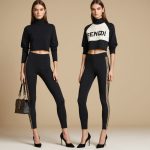Current Eco-Friendly Practices in UK Women’s Fashion
The UK fashion industry increasingly prioritizes eco-friendly fashion UK initiatives to reduce environmental impact. Leading brands adopt sustainable fashion practices such as using organic fibers, recycled materials, and low-impact dyes. These methods minimize waste and pollution throughout production.
A core focus is the importance of circular fashion—designing garments for longevity, repair, and recyclability. Closed-loop systems enable materials to be reused continuously, preventing textile waste from ending in landfills. This shift supports the UK’s goal of becoming a leader in environmentally sustainable trends.
In the same genre : How Might Emerging British Designers Shape the Future of Women’s Fashion?
Additionally, rising consumer demand for green and ethical options pushes brands to innovate. Shoppers now seek transparency about sourcing, fairness in labor, and reduced carbon footprints. This transparency drives brands to improve and communicate their sustainability efforts more clearly.
The UK’s combination of regulatory support, consumer activism, and industry innovation fosters a fashion landscape where eco-friendly fashion UK is no longer optional but central to brand identity and consumer choices. This growing momentum promises meaningful progress toward a more sustainable fashion future.
Also read : What’s the Most Surprising Trend in UK Women’s Fashion Today?
Innovative Sustainable Materials and Fabrics
Exploring eco-friendly materials is essential for those seeking sustainable fabrics UK consumers value. These fabrics reduce environmental harm without compromising style or comfort. Among the latest innovations, recycled textiles are especially noteworthy. Materials such as recycled polyester, made from plastic bottles, offer durability while diverting waste from landfills and oceans.
Plant-based fabrics like Tencel and bamboo are gaining popularity for their natural biodegradability and low water footprint. Tencel, derived from sustainably managed eucalyptus trees, is both soft and breathable, making it ideal for everyday wear. Bamboo fabric is praised for its rapid growth and minimal pesticide use, creating less environmental strain than traditional cotton.
Certifications play a critical role in ensuring authenticity within eco-friendly fashion. Look for standards like GOTS (Global Organic Textile Standard) and OEKO-TEX, which verify organic content and toxin-free production processes. Such certifications guarantee the use of sustainable fabrics UK brands promote, helping consumers make informed, responsible choices.
These innovations and certifications demonstrate a clear commitment to advancing eco-friendly materials in women’s fashion, driving the industry toward a greener future.
Standout UK Eco-Conscious Fashion Brands and Designers
Discovering UK sustainable fashion brands reveals a vibrant community of ethical designers and eco-friendly retailers UK committed to reducing environmental impact. Renowned British labels have taken bold strides by incorporating organic materials, adopting zero-waste production, and championing fair labor practices. These brands demonstrate how style and sustainability can coexist without compromise.
Among pioneering examples, some UK brands stand out by transforming discarded fabrics into innovative collections, highlighting circular fashion principles. Their eco-initiatives often extend beyond materials to include community education and transparent supply chains—both essential in building consumer trust.
In addition to established names, several emerging talents are catching attention for their fresh approach to eco-conscious design. These designers integrate biodegradable textiles and cutting-edge sustainable techniques into their work while advocating for slow fashion ethics. Their creative visions signal the future direction of UK sustainable fashion brands, inspiring consumers to consider not only aesthetics but also environmental responsibility.
By supporting these standout UK brands and designers, shoppers contribute directly to a greener fashion industry that values ethical choices and innovation.
Trends in Sustainable Production and Distribution
Sustainable production has become a key focus in fashion, with brands adopting eco-friendly supply chain practices to reduce environmental impact. Innovations such as low-impact dyeing and waterless processes minimize water consumption and chemical use. Energy reduction through efficient machinery and renewable sources further contributes to greener manufacturing.
Local, small-batch manufacturing also plays a pivotal role. Producing closer to the consumer decreases transportation emissions and supports local economies. This approach aligns well with sustainability goals by reducing overproduction and waste.
Transparency in fashion is advancing, empowering responsible consumers to make informed choices. Technologies like blockchain are increasingly used to enhance traceability, providing detailed information about a product’s journey from raw materials to finished garment. This transparency encourages accountability throughout the eco-friendly supply chain.
By incorporating these trends, brands can balance quality, ethics, and environmental stewardship, meeting the growing demand for sustainable fashion while fostering trust and engagement with consumers.
Recent Sustainable Style Trends (2023-2024)
Sustainable style UK has seen a remarkable shift towards latest eco trends 2023, with designers embracing nature-inspired silhouettes and organic textures. Flowing, loose fits combined with earthy tones dominate collections, reflecting a growing preference for comfort and environmental mindfulness. Patterns often include botanical prints and minimalist designs, marrying aesthetics with eco-conscious choices.
Upcycling is a standout trend, turning pre-loved garments into unique, high-fashion pieces. This approach avoids waste while offering creative, one-of-a-kind styles. Rental fashion gains traction, especially in urban areas, providing consumers with flexible wardrobes and reducing garment production. Vintage revivals also play a crucial role, encouraging shoppers to explore thrift stores or online second-hand platforms to find timeless items.
Social media’s power cannot be overstated in propelling green fashion 2024 forward. Influencers and consumers alike share sustainable outfit ideas, sparking broader awareness and participation. Platforms serve as vibrant hubs where information exchanges fuel demand for ethical brands. Ultimately, the sustainable style UK movement thrives on this consumer-driven change, marrying innovation with responsibility.
Actionable Tips for Eco-Conscious Shoppers
Understanding eco-conscious shopping involves more than just picking items labeled “sustainable.” Start by critically evaluating sustainability claims. Look for transparent information about materials, production processes, and certifications. Beware of vague terms and prefer brands that provide clear evidence of their environmental impact.
Building a sustainable wardrobe UK means focusing on quality over quantity. Choose durable fabrics like organic cotton, linen, or recycled materials that reduce waste and extend garment life. Repair and upcycle clothes whenever possible, minimizing the need to buy new items frequently.
Supporting UK brands is a practical way to reduce your carbon footprint. Brands that manufacture locally tend to have better control over ethical labor and environmental standards. Research brand ethics thoroughly; seek out those committed to reducing waste and using eco-friendly packaging.
By combining ethical consumer tips with deliberate choices, shoppers can foster a more sustainable fashion habit. Prioritize versatility in your wardrobe to ensure each piece serves multiple purposes and seasons, further cutting down fashion waste.



